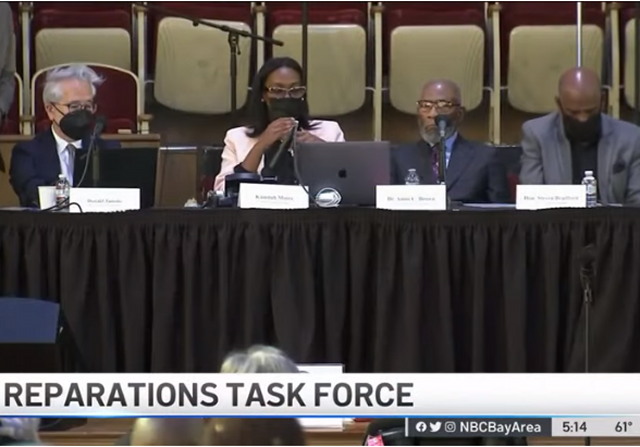Argument Over Reparations Affected by Supreme Court Ruling on Affirmative Action
“They’re asking for a lot. They’re asking for what would obviously bankrupt the state”

John Murawski has written an analysis of this subject at Real Clear Investigations with comments from a number of legal experts. Our own Professor Jacobson is quoted:
After Supreme Court Ruling, Reparations Fight Lives On as ‘Not Race-Based’
The uncertain legality of paying reparations for slavery and its legacies came into focus last week when the U.S. Supreme Court rejected racial preferences in college admissions nationwide. But while some see the ruling as a major setback for the reparations movement, it isn’t likely to deter its advocates, who say that redress for racial discrimination would not be based strictly on race.
The same day the Supreme Court declared the admissions practices at Harvard College and the University of North Carolina unconstitutional, Kamilah Moore, head of the California task force at the forefront of the national reparations effort, announced on Twitter that the cause is not affected by the decision: “Our reparations recommendations are not race-based, but rather are based on lineal descent.”…
William Jacobson, clinical professor of law at Cornell Law School and president of the Legal Insurrection Foundation, which runs conservative websites, said the task force presumes every black person is a powerless victim who deserves compensation – precisely the sort of crude stereotyping the Supreme Court majority has rejected. Jacobson further said that calculating only harms without considering “the other side of the ledger” – like government assistance or other benefits someone’s parents or grandparents may have accrued over a lifetime – is a dishonest moral calculus.
“They’re asking for a lot. They’re asking for what would obviously bankrupt the state,” said University of San Diego law professor Gail Heriot, who helped lead the movement to defeat racial preferences in 2020 as co-chair of the Californians 4 Equal Rights/No on Prop 16, and in 1996 co-chaired Yes on Proposition 209, which implemented the state’s ban on racial preferences.
“Reparations of this kind will likely lead to inter-racial and inter-ethnic strife – just the opposite of what the California’s leaders should be trying to do,” she said. “It’s unlikely to go down well with the people who are paying the taxes for this.”
 DONATE
DONATE
Donations tax deductible
to the full extent allowed by law.








Comments
Imagine the things that Ms. Moore and colleagues discuss in private.
Or when casually chatting amongst friends and family.
It is an idea that shouldn’t even be entertained. (Not censored but scoffed at mercilessly and the proponents told to go away and stop pestering us.)
If enacted, it should require for those receiving it…
1 Descent from slaves, reduced for the portion of lineage not descended thusly,
2 The ancestor having been enslaved in California,
3 The descendant’s family having lived continuously in California from 1865 until now.
It should require for those paying for it…
1 Descent from slaveholders, required payment being reduced by the proportion of lineage descended from non-slaveholders,
2 The ancestor having held those slaves while in California,
3 The family having lived in California from 1865 until now.
That, at least, pays off the actually injured party (yeah, that’s questionable…) with proceeds taken from the injuring party (same, same). Which would seem to be the requirement, under law, for this punitive payment.
There are no descendants of slaves who were enslaved in the American state of California. The first California constitution banned slavery. Before then:
Most Indian tribes, probably including those in California, kept a few war captives as slaves. (The only ones that didn’t were the ones that killed all their prisoners.) But this slavery was not permanent; within a few years the slaves were either adopted into the tribe, killed, or died of abuse and neglect. The only ones who left descendants were those adopted, and their children were free and members of the tribe. If there are any surviving descendants, they’re descendants of both slaves and enslavers – and also neither black nor white, so probably not affected by the “reparations” proposals.
The colonial Spanish allowed slavery but in California they seem to have mainly attempted to make serfs out of the Indians, rather than importing Africans. Perhaps those Indians were victims of slavery, but they were never slaves to Americans – but when white Americans came to power in Caifornia, they very nearly exterminated every Indian, so looking for compensation just for slavery would miss the point.
When the Mexicans successfully revolted against Spain, they banned slavery. It’s likely that some Indians were still held (illegally) in what amounted to serfdom, and it’s likely that some of the Anglos who were flooding into California were southerners wealthy enough to bring a few slaves with them – but they had to keep those rather conspicuous blacks out of sight of the authorities.
During the Mexican-American War, the Anglos in California revolted against Mexico, and were aided by a US military expedition. This brought California into the US. From 1847 to 1849, it was under US military rule. The first military commander was John C. Fremont, an abolitionist, but it’s not clear if slaves were banned or if this ban was enforced effectively. Then in 1849, California adopted a constitution that banned slavery and became a free state of the US..
So those two years of military rule were the only time in the entire history of California that there _might_ have been slaves under American jurisdiction. But the state of California did not exist yet. Are they claiming responsibility for slavery before the state existed, or for slaves in other parts of the country? In that case, they might as well try to compensate descendants of English people enslaved by Vikings…
Doesn’t the demand to abolish the obligation of black parents to support their own children undercut ‘lineal descent’ as a basis for reparations?